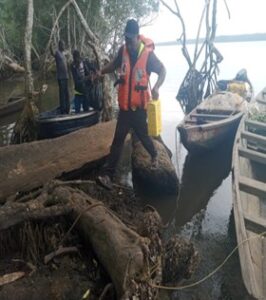Bringing Immunization Services to Hard-to-Reach Communities
Vaccinating the population against diseases like polio, measles, and yellow fever is a priority for the Government of Cameroon. However, logistical challenges often hinder access to vaccines, particularly in areas with rugged terrain and no car-accessible roads.
Dr. Shalom, Permanent Secretary of the Expanded Program on Immunization (EPI) Central Coordination Unit, acknowledges these obstacles: “The critical need to vaccinate our population is evident, but reaching certain localities poses significant challenges, requiring substantial resources.”
The emergence of the COVID-19 pandemic underscored the importance of vaccination, not only against this novel coronavirus but also against other preventable diseases.

Deployment of a vaccination team in Cameroon, Manoka Health District, Littoral Region. Photo credit: Alice Malagal, MTaPS Technical Advisor, MSH
In response, USAID, through its Medicines, Technologies, and Pharmaceutical Services (MTaPS) Program led by Management Sciences for Health, partnered with Dr. Shalom and other health workers to ensure the delivery of routine vaccination services, including polio, measles, yellow fever, and COVID-19 vaccines, to communities in the Centre, Littoral, and West regions, irrespective of their geographical challenges.
USAID MTaPS and EPI started the process by identifying 752 hard-to-reach villages across the 3 regions, estimating target vaccine populations, and budgeting for necessary campaign costs. Then they trained 1,289 community health workers in outreach immunization awareness strategies and door-to-door campaigns, equipping them with essential tools such as vaccination registers and tally sheets. Additionally, logistical support—including the rental and fuel for 251 motorcycles, 7 speedboats, and 26 pirogues—was provided to ensure the success of these efforts.
This collaborative approach resulted in significant achievements surpassing the original objectives. Dr. Shalom emphasizes: “The support from USAID MTaPS was instrumental in not only integrating routine vaccination catch-up services but also facilitating the deworming of children over 6 months and reaching pregnant women for life-saving vaccination.”

Dr. Shalom in his office in Yaoundé
Between April and August 2023, 7,359 children aged 0–5 years received the vaccine doses they needed, 13,959 children were dewormed, 13,661 children aged over 6 months received vitamin A supplements, 105,604 doses of COVID-19 vaccine were administered, and 323 pregnant women received at least 1 dose of anti-tetanus vaccine.
The success of the collaboration between USAID and EPI serves as a model for future endeavors. Dr. Shalom remarks, “The work done provides a roadmap for future initiatives, encouraging us to replicate it in other regions of Cameroon. We can congratulate ourselves and our partner, USAID MTaPS, for the good work that was done.”

Door-to-door vaccination team in Manoka, Littoral Region. Photo credit: Dr. Ndombé, Lead for the Health District of Manoka